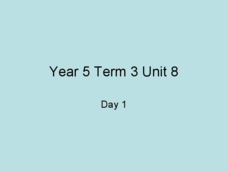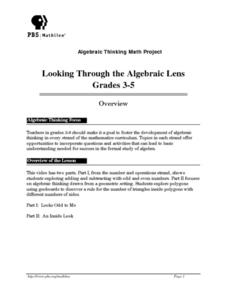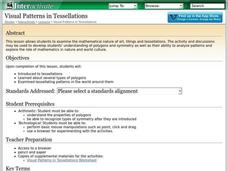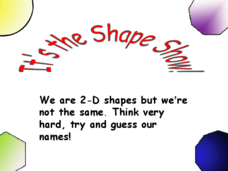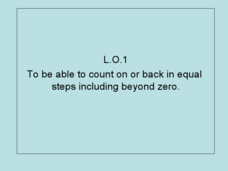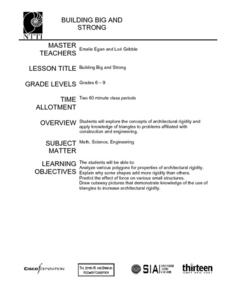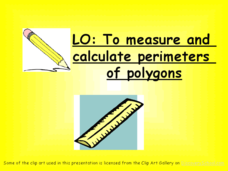Curated OER
What a Square
Students examine the painting "Old Man With A Gold Chain" by Rembrandt. They identify geometric shapes in the painting, measure these shapes and compare the relationships of these measurements.
Curated OER
Visualizing and Naming Polygons
A really useful resource contains 116 slides covering basic geometric concepts related to 2-D or plane shapes. Shape properties, translations, reflections, congruence, symmetry, and grid work are all laid out in a comprehensive and...
Curated OER
Looking Through the Algebraic Lens
Students work with rectangles to find generalizations for adding and subtracting odd and even numbers in part one of the lesson. In part two, students use geoboards to construct polygons, look for patterns, and find a general rule.
Teachers Network
A World of Symmetry: Math-Geometry
Define and identify the three basic forms of symmetry translation, rotation, and glides with your class. They cut out and arrange paper pattern blocks to illustrate symmetry, create a Cartesian graph, and design a rug with a symmetrical...
Curated OER
Similar Shapes
In geometry, similar and congruent shapes are often confused. Shapes that are similar are the same shape, but a different size. This activity gives young learners some practice in identifying similar shapes. There are five polygons...
Curated OER
Congruent Polygons: Copying Stretchy Shapes
Third graders investigate congruent polygons through dance. In this congruency instructional activity, 3rd graders do the "brain dance" as a warm up. They review polygon names by singing "The Polygon Chant," before mirroring congruent...
Curated OER
Spotting Polygons
See all sides of the story with a worksheet on geometric shapes! After studying the example at the top, which matches polygons with solid figures, second graders circle shapes that are named in the directions. Next, they match polygons...
Curated OER
Properties of Polygons, Same-Length Sides
Can your third graders spot the differences between these geometric shapes? After studying several sections of triangles, rectangles, and other polygons, learners circle the shape described in each set of instructions. For extra...
Curated OER
Properties of Polygons, Parallel Sides, and Right Angles
Have fun with shapes! Third graders read a set of instructions and circle the shape in the description. They work on recognizing parallel sides and right sides. Use this resource as homework after your geometry lesson.
Curated OER
Tiling the Classroom
Students see how to identify regular polygons, how to slide, turn and flip polygons, and why certain polygons tessellate better than others. Groups create a one foot square design to be used to tile the classroom. Great instructional...
Curated OER
Transformations - Rotations in the Coordinate Plane
In this geometry lesson, math scholars brainstorm examples of rotations. Using the SMARTboard, students observe a rotation. They create their own rotation using graph paper. Finally, pupils complete a worksheet and graph rotations.
Shodor Education Foundation
Visual Patterns in Tessellations
Geometers explore the concept of tessellations. They use a tessellation applet to manipulate shapes and design their own tessellation using the applet.
Curated OER
The Shape Show
Define plane shapes by their properties, then use this game to reinforce those skills. Learners use given properties as clues to determine each shape. They work to name ten different shapes, six of which are polygons.
Curated OER
Year 5 Unit 2b
This slide-show is packed with information relating to a variety of mathematical concepts. Intended as an accompaniment to a full unit, this resource provides definitions, explanations, and opportunities for learners to practice their...
Curated OER
Classifying Polygons
A straight edge, a right angle, a number of vertices; sounds like it's time to classify polygons. That's right you and your class will learn all about the properties of polygons and how to classify them with this easy to follow...
Curated OER
2D Shapes
This engaging presentation would be helpful for your young learners of geometry. Pupils are given clues as to what a shape may be, then they have to use those clues to guess what shape is being described. Shapes used are the circle,...
Curated OER
Measures Combined
Use this resource to teach perimeter of regular plane shapes, measurement, rounding, and systematic problem solving skills. There are 78 complete slides and two game suggestions intended to facilitate content understanding.
Curated OER
Year 5 Unit D1
This presentation is intended to accompany an entire unit and covers a wide variety of concepts. Counting on, counting back, symmetry, properties of 2-D shapes, completing symmetrical patterns, and measuring angles are all covered.
Curated OER
Building Big and Strong
Middle and high schoolers explore the concepts of architectural rigidity. They analyze a variety of polygons, and explain why some shapes add more strength to structures than others. The PBS video, "Building Big," is utilized in this plan.
Curated OER
Poly-Mania
This hands-on lesson takes young geometers on a tour of 2D polygons and 3D polyhedrons. After exploring different web resources and discussing geometric shapes, small groups construct models of polyhedrons using bendable straws. Note:...
Curated OER
Calculating and Measuring Perimeters of Polygons
If you're teaching 3rd or 4th grade math, this presentation is a must have. It defines perimeter and polygons, then describes the process by which perimeter is determined through pair share discussion and critical thinking questions....
Curated OER
"Polly"gon Pockets
Explore polygons with your elementary learners. Divide the class in 12 to configure the polygon puzzle before them. They list the attributes of each type of polygon they see, and if there's time, they jump on the interactive website...
Utah Education Network (UEN)
Create, Classify, and Sort Quadrilaterals
Quadrilaterals can be quirky! Fourth graders use geoboards and bands to create four-sided figures. They analyze the attributes such as angle size and presence of parallel sides. As a result they learn to differentiate among rectangles,...
Curated OER
Can You Name That Shape?
Learners use materials to build, investigate, and draw two-dimensional shapes (polygons). They combine the shapes they have built and draw from the pile to begin a round-robin activity to name and determine the attributes of a selection...



